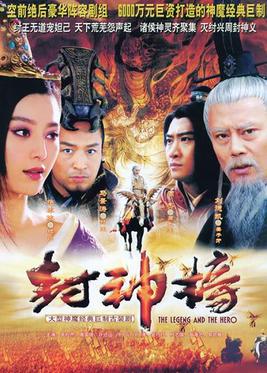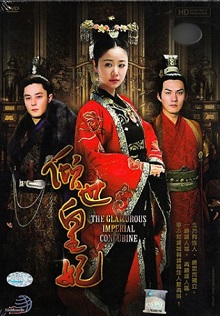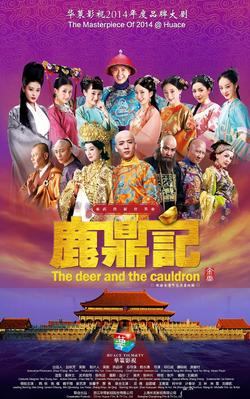
Wu Sangui, courtesy name Changbai (長白) or Changbo (長伯), was a Chinese military leader who played a key role in the fall of the Ming dynasty and the founding of the Qing dynasty. In Chinese folklore, Wu Sangui is regarded as a disreputable Han Chinese traitor for his surrender to the Manchu invaders, suppression of the Southern Ming resistance and execution of the Yongli Emperor. Wu eventually double-crossed both of his masters, the Ming and the Qing dynasties.
For most of its history, China was organized into various dynastic states under the rule of hereditary monarchs. Beginning with the establishment of dynastic rule by Yu the Great c. 2070 BC, and ending with the abdication of the Xuantong Emperor in AD 1912, Chinese historiography came to organize itself around the succession of monarchical dynasties. Besides those established by the dominant Han ethnic group or its spiritual Huaxia predecessors, dynasties throughout Chinese history were also founded by non-Han peoples.

The Emperor in Han Dynasty, also released under the title The Emperor Han Wu in some countries, is a 2005 Chinese historical drama television series based on the life of Emperor Wu of the Han dynasty. It uses the historical texts Records of the Grand Historian and Book of Han as its source material.
Wang Liqun is a Chinese historian and a professor in the School of Arts, Henan University. He is best known for conducting lecture series about Chinese history on the CCTV-10 television programme Lecture Room.
The literary inquisition, also known as speech crime (以言入罪), refers to official persecution of intellectuals for their writings in China. The Hanyu Da Cidian defines it as "the ruler deliberately extracts words or phrases from intellectual's writings and arbitrarily accuse him in order to persecute him" ("旧时谓统治者为迫害知识分子,故意从其著作中摘取字句,罗织成罪"). The inquisition took place under each of the dynasties ruling China, although the Ming dynasty was particularly notorious for the practice.
The Wu Chinese people, also known as Wuyue people, Jiang-Zhe people (江浙民系) or San Kiang (三江), are a major subgroup of the Han Chinese. They are a Wu Chinese-speaking people who hail from southern Jiangsu Province, the entirety of the city of Shanghai and all of Zhejiang Province, as well as smaller populations in Xuancheng prefecture-level city in southern Anhui Province, Shangrao, Guangfeng and Yushan counties of northeastern Jiangxi Province and some parts of Pucheng County in northern Fujian Province.

The Story of Han Dynasty is a Chinese television series based on the events in the Chu–Han Contention, an interregnum between the fall of the Qin dynasty and the founding of the Han dynasty in Chinese history. The series was first broadcast on CCTV in China in 2003. Directed by Wei Handao, the series starred Hu Jun, Xiao Rongsheng, Jacklyn Wu, Kristy Yang, Wang Gang and Li Li-chun.

The Water Margin is a 1998 Chinese television series adapted from Shi Nai'an's classical 14th-century novel of the same title. It was produced by CCTV with Zhang Jizhong as producer. It was first broadcast in China in January 1998. The series also featured action choreography by Yuen Woo-ping.

The Legend and the Hero was a 2007 Chinese television series adapted from the 16th-century novel Fengshen Yanyi written by Xu Zhonglin and Lu Xixing. The first season started airing on CCTV-8 in February 2007. It was followed by a sequel, The Legend and the Hero 2 in 2009.

The Taiping Heavenly Kingdom is a Chinese television series based on the events of the Taiping Rebellion and the rise and fall of the Taiping Heavenly Kingdom in the late Qing dynasty. The 48-episode series was first broadcast on CCTV in China in 2000. The series was also broadcast on STAR Chinese Channel in Taiwan and on ATV in Hong Kong.

The Affaire in the Swing Age, also known as The Dynasty or Love Against Kingship, is a 2003 Chinese television series based on the novel Jiangshan Fengyu Qing by Zhu Sujin, who was also the screenwriter for the series. The series depicts the events in the transition of the Ming dynasty to the Qing dynasty in China, focusing on the lives of historical figures such as Li Zicheng, Wu Sangui, Chen Yuanyuan, the Chongzhen Emperor and Huangtaiji.

The Glamorous Imperial Concubine is a 2011 Chinese television series based on a novel of the same title by Murong Yin'er (慕容湮儿). Starring Ruby Lin with Kevin Yan and Wallace Huo, it was Lin's producing debut.

Wu Zetian is a Chinese television series based on the life of Wu Zetian, the only woman in Chinese history to assume the title of Empress Regnant and became the de facto ruler of China in the late seventh century. Directed by Chen Jialin, the series starred Liu Xiaoqing as the title character. It was first broadcast on CCTV in China in 1995 and subsequently aired by television stations in other countries.
Beauty World, also known as Tang Gong Meiren Tianxia and World of a Beauty, is a Chinese fantasy-supernatural television series set in the Tang dynasty. It was directed by Lee Wai-chu, produced and written by Yu Zheng, and starred Zhang Ting, Ming Dow, Li Xiaolu, Mickey He, Zheng Guolin, Yang Mi and Tong Liya in the leading roles. The series is regarded as a counterpart to Beauty's Rival in Palace, a similar 2010 television series set in the Han Dynasty. It was first aired on 21 October 2011 on Guangzhou Zonghe Channel in mainland China.

The Deer and the Cauldron is a Chinese television series adapted from Louis Cha's novel The Deer and the Cauldron. It was directed by Lai Shui-ching, and starred Han Dong, Wei Qianxiang and others. The series was shot from September–December 2013, and first aired on Anhui TV, Sichuan TV and Yunnan TV from 20 December 2014 to 9 January 2015.

How Much Sorrow Do You Have, also known as The Real Warrior in some countries, is a 2005 Chinese historical drama produced by Beijing HualuBaina Film & TV Co. It was first broadcast on China Television in Taiwan in August 2005. In mainland China it was first broadcast on CCTV-8 in 2006. The title is directly taken from a poem by Li Yu, the protagonist of the drama.

The Four is a 2015 Chinese television series starring Hans Zhang, Yang Yang, William Chan and Mao Zijun. It is the latest adaption of Woon Swee Oan's novel Si Da Ming Bu. The series aired on Hunan TV from 17 March to 23 June 2015.

The Great Emperor in Song Dynasty is a 2015 Chinese historical TV series directed by Gao Xixi, starring Chen Jianbin as Emperor Taizu of Song who founded the Song dynasty and reunified most of China proper.
Dongfang Shuo is a 2008 Chinese historical and biographical television series centered on Dongfang Shuo, a Han dynasty scholar-official, fangshi, author, and court jester to Emperor Wu. It is based on the novel Wisdom Holy Dongfang Shuo by Dongfang Longyin. The series was jointly by China Central Television, Beijing Film Academy and Guangdong Donghexing Recording and Video Company. The series stars Cheng Qian as Dongfang Shuo, the rest of the main cast includes Jin Dong, Hu Ke, Qin Hailu, Yu Xiaowei, Liu Xiyuan, Hu Yajie, Tao Huimin, and Zhang Lingxin. It originally aired on CCTV-8 in August 2008.